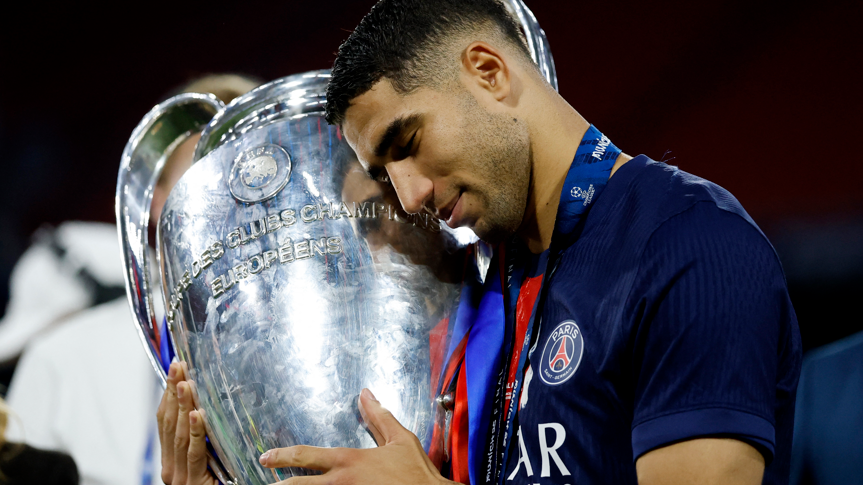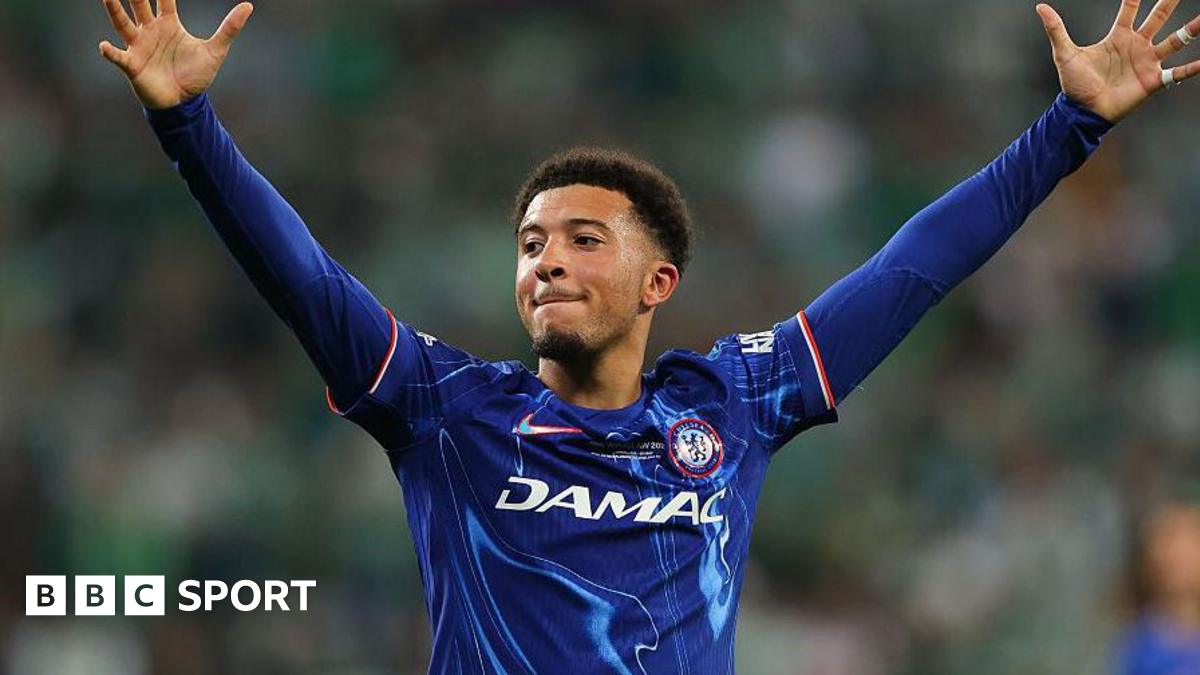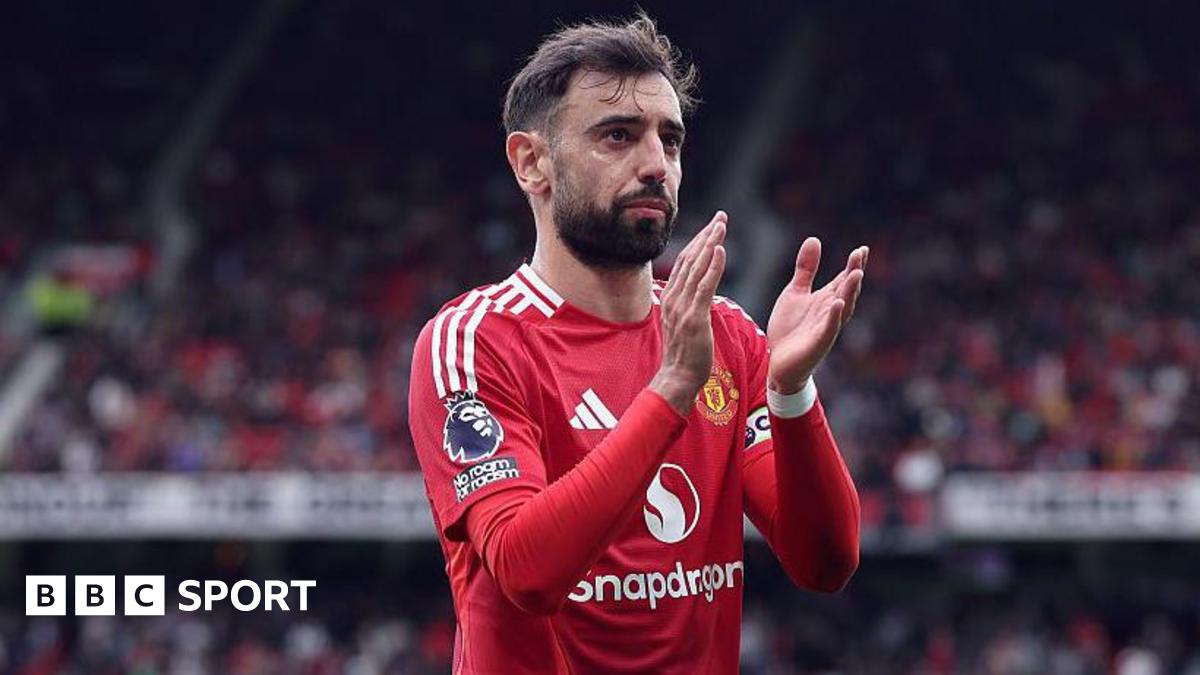 Image source, Reuters
Image source, Reuters
Paris St-Germain became European champions for the first time in what was their 168th game in the competition
Neil Johnston
BBC Sport journalist
Paris St-Germain are the champions of Europe - first-time winners after thrashing Inter Milan 5-0 in the most one-sided final of the competition's history.
They are the first French side to win the coveted prize since Marseille in 1993 and only the 24th different club to lift the famous trophy.
On paper the Champions League and its new format appears a more diverse competition - before you remember PSG's starting XI in Munich cost £403m to assemble, compared to the £137m Inter paid for their starting side.
"Everyone criticised us and doubted us, lots of people didn't believe in our project," PSG president Nasser Al-Khelaifi told Canal Plus.
"The objective now is to win again. It has taken 14 years of hard work but we are building something for the future."
Qatar Sports Investments bought PSG in 2011. Since then the club has spent 2.3bn euros (£2.1bn) on transfer fees,, external according to estimates from Transfermarkt.
"If you take a look at their wage bill from last season, it was probably one of the top two or three highest in European football," football finance expert Kieran Maguire told BBC Sport.
"It's romantic in the sense they won the Champions League for the first time and the football was absolutely brilliant. But from a financial point of view, you would expect them to be there or thereabouts."
The last club to win the Champions League for the first time were Manchester City, who are under Abu Dhabi ownership and, according to Deloitte's Money League, are the second richest club in the world behind only Real Madrid and one place above PSG.
The new Champions League format involves more teams - 36 in the competition proper instead of 32 under the old format - while the new league phase offers fans more games, more goals and a chance to see European heavyweights play one another more frequently.
It was introduced following the collapse of a new European Super League (ESL),, external as most of the teams involved withdrew after a backlash led by fans.
But is the new-look Champions League a European Super League in all but name?
What was the European Super League and why was it controversial?
Twelve of Europe's leading clubs - including six from the Premier League - signed up to plans to form a European Super League in 2021.
Arsenal, Chelsea, Liverpool, Manchester United, Manchester City and Tottenham were the English representatives, joining AC Milan, Inter Milan, Juventus, Real Madrid, Atletico Madrid and Barcelona as founding members.
The league would have essentially replaced the Champions League as Europe's elite competition, but would not have had the same qualification process whereby teams could enter via their domestic position.
At the same time, the founding members wanted to remain part of their respective domestic leagues.
The plans proved controversial, not just with supporters but with rival clubs who said it devalued domestic competition.
Given founding members of the competition could not be 'relegated' from it, critics argued the tournament was a closed book for Europe's elite teams.
PSG and Bayern Munich rejected approaches to join, while fans from the clubs involved held several protests, leading to all six English clubs withdrawing from the process.
'Not right England have six Champions League spots'
Next season's Champions League will include six English Premier League teams instead of the usual four.
Newcastle United, who finished fifth in the table, will play in the competition after European football's governing body Uefa awarded two bonus spots to the domestic leagues which performed best in Europe in 2024-25.
Meanwhile, Tottenham - who finished 17th - will also join Liverpool, Arsenal, Manchester City and Chelsea in the competition after winning the Europa League.
Twenty-two of the 36 places in the league phase will come from Europe's top-five leagues, with Spain securing five spots, Germany and Italy four each, while France will have three teams.
In addition, the Netherlands will have two teams in the league phase, while Portugal, Greece, Czech Republic, Turkey and Belgium will have one team each.
Just 11 of those 29 clubs have qualified for the league phase as champions of their country this season.
That leaves only seven places to be decided through the qualifying rounds.
"I don't think it's right that England should have six teams in the Champions League," said Ian Dennis, senior football reporter at BBC Radio 5 Live., external
"I know why. We're gearing ourselves towards...it's effectively a Super League in all but name.
"But if you think about it, the dominance of the Premier League teams in the various European competitions, the English coefficient unless it's unusual, will always be in the top three, if not the top two.
"And therefore the English clubs are always going to benefit with the extra place.
"Now England have got six clubs in the Champions League, Spain have got five…I think it's going to be very hard to try to wrestle that away from the English sides."
Will an underdog win the Champions League again?
Who were the last true underdogs to win the Champions League - and will it happen again?
Jose Mourinho's Porto enjoyed a fairytale run to the final, external in 2003-04, which included beating a dominant Manchester United along the way, before defeating Monaco 3-0 in the final.
In 21 editions since, there have been 10 different winners - Real Madrid (six times), Barcelona (4), Liverpool (2), Chelsea (2), Bayern Munich (2), AC Milan (1), Manchester United (1), Inter Milan (1), Manchester City (1) and Paris St-Germain (1).
"The probability of another Porto winning the Champions League is about the same as another Leicester City winning the Premier League," Maguire added.
"We've had a concentration of wealth in the hands of fewer and fewer clubs. We have got the rise of dynasties now.
"The Champions League is very much geared and tiered towards wealthy clubs - and that's due to having to give away concessions to the Super League clubs in order to dissuade them from reconsidering setting up their own competition."
Arsenal the next first-time winners?
After Manchester City's success in 2023 and PSG's triumph in Munich, who will be the next first-time winners?
"Arsenal are well placed because they do have serious investment as far as the squad is concerned - probably in the region of £700m to £800m," added Maguire.
Inter Milan were the last Italian club to win the Champions League in 2010 when Mourinho was in charge.
Maguire added: "Could we see another Italian club perhaps do it? Possibly, but I honestly believe it's unlikely. In France, it's PSG or nobody given the collapse of the French TV deal., external
"In Germany? As a romantic you'd hope that Borussia Dortmund could do it. In Spain, if Atletico Madrid can get their ducks in order.
"That's probably as far as we can go."
A 'new era' of the Champions League - all you need to know

 2 days ago
5
2 days ago
5









